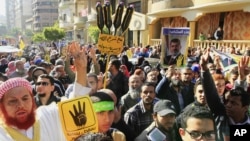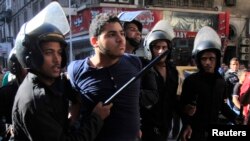CAIRO, EGYPT —
With a spare bed always ready for friends on the run, Wafaa Hefny is not your average English literature professor.
In her spare time, the 47-year-old veiled academic is trying to save the Muslim Brotherhood, the outlawed group that Egypt's army-backed authorities brand a “terrorist group”, by ensuring it remains committed to peaceful change and rejects violence.
With most Brotherhood leaders, including Egypt's deposed president Mohamed Morsi, now behind bars, the granddaughter of Brotherhood founder Hassan al-Banna is one of the movement's few influential figures still at large.
Hefny wants to prevent a frustrated younger generation of supporters from taking up arms in the face of one of the toughest crackdowns on the group and its 86-year history.
“The harder the state presses us, the more committed we should be to peaceful activism. That is what gives us strength. Violence would be very dangerous for us,” she said.
“There are some young Islamists and others trying to get our youth to become violent. We have to stop this.”
Resorting to violence would be disastrous because the movement would lose its moral high ground and provide an excuse to the government to crack down even harder, Hefny said.
To give the young an outlet to let off steam, Hefny organizes clandestine meetings where they can use social media, write film scripts and design anti-government logos.
Children as young as 10 daub graffiti on walls mocking Abdel Fattah el-Sissi, the general who ousted Morsi last July after mass protests against his rule. Sissi is tipped to win next month's presidential election in Egypt.
“This is starting to move things and give them ideas ... To keep people going so they can discover new things,” said Hefny, a tall imposing figure who lives in a middle class district.
Hefny also directed a play starring Brotherhood youth which had a simple and ambitious plot: the movement would one day return to power and Sissi would face a court martial.
Pressures
Such initiatives may not be enough to restrain young people in the Brotherhood, which steadily earned popularity over the decades by providing social services to Egypt's poor but faced repression under one autocratic ruler after another.
Apart from the crackdown by security forces, Brotherhood youth face many other challenges. They are demonized by the state press, thousands of their comrades are in jail and jobs are all too scarce in Egypt's gloomy economic climate.
Hefny said jailed members such as Morsi had diminishing sway while emerging new leaders were offering the young a greater say in how the famously hierarchical movement is run.
In a sign the movement's old guard understands the dangers of radicalization, its exiled secretary general issued a lengthy statement on Tuesday underscoring the Brotherhood's history of peaceful activism and rejecting the use of violence.
The letter from Mahmoud Hussein was the highest level statement from a senior figure not jailed in the crackdown.
Egyptian authorities have not provided evidence to back their accusations that the Brotherhood is involved in terrorism, but it is clear that younger members are losing patience with the movement's traditional pacifism.
In a downtown Cairo cafe, a Muslim Brotherhood member who only wanted to give his first name, Mohamed, said some leaders of what he calls youth cells told him they were considering the use of lethal force against policemen with blood on their hands.
“We know where these people live,” the youth, who said he was tortured in prison, told Reuters.
A second member, who requested anonymity, said: “Of course some youth will want revenge and killings are taking place on an individual basis.”
More than 1,000 pro-Morsi supporters have been killed by army and police forces during a major crackdown on two protest sit-ins in Cairo in August last year.
Though adamantly opposed to violent reprisals, Hefny said she believed men in the security forces who have abused detained women members of the Brotherhood should be publicly shamed.
“We harass these security men who rape. We send messages to them and write on their houses. We say 'your father or son did this' and this will pressure them to stop',” said Hefny.
General Ahmed Helmy of the Interior Ministry's media section denied all Brotherhood allegations of torture or rape.
“We ask any prisoner who has a complaint to submit an official complaint and we will investigate fairly and until that gets proven, then it is all talk with no evidence,” he said.
Hefny, who teaches at Al-Azhar University, said she was constantly reminded of the risks she faces because of her work for the Brotherhood. Secret policemen sometimes ask her neighbors for information about her, she said.
Asked why she was not already in jail, Hefny smiled and recalled her grandfather who was assassinated in 1949.
“This is love that comes from the spirit of Hassan al-Banna,” said Hefny, who uses an old model cellphone she thinks cannot be tapped. “Also my mother prays for me every day.”
In her spare time, the 47-year-old veiled academic is trying to save the Muslim Brotherhood, the outlawed group that Egypt's army-backed authorities brand a “terrorist group”, by ensuring it remains committed to peaceful change and rejects violence.
With most Brotherhood leaders, including Egypt's deposed president Mohamed Morsi, now behind bars, the granddaughter of Brotherhood founder Hassan al-Banna is one of the movement's few influential figures still at large.
Hefny wants to prevent a frustrated younger generation of supporters from taking up arms in the face of one of the toughest crackdowns on the group and its 86-year history.
“The harder the state presses us, the more committed we should be to peaceful activism. That is what gives us strength. Violence would be very dangerous for us,” she said.
“There are some young Islamists and others trying to get our youth to become violent. We have to stop this.”
Resorting to violence would be disastrous because the movement would lose its moral high ground and provide an excuse to the government to crack down even harder, Hefny said.
To give the young an outlet to let off steam, Hefny organizes clandestine meetings where they can use social media, write film scripts and design anti-government logos.
Children as young as 10 daub graffiti on walls mocking Abdel Fattah el-Sissi, the general who ousted Morsi last July after mass protests against his rule. Sissi is tipped to win next month's presidential election in Egypt.
“This is starting to move things and give them ideas ... To keep people going so they can discover new things,” said Hefny, a tall imposing figure who lives in a middle class district.
Hefny also directed a play starring Brotherhood youth which had a simple and ambitious plot: the movement would one day return to power and Sissi would face a court martial.
Pressures
Such initiatives may not be enough to restrain young people in the Brotherhood, which steadily earned popularity over the decades by providing social services to Egypt's poor but faced repression under one autocratic ruler after another.
Apart from the crackdown by security forces, Brotherhood youth face many other challenges. They are demonized by the state press, thousands of their comrades are in jail and jobs are all too scarce in Egypt's gloomy economic climate.
Hefny said jailed members such as Morsi had diminishing sway while emerging new leaders were offering the young a greater say in how the famously hierarchical movement is run.
In a sign the movement's old guard understands the dangers of radicalization, its exiled secretary general issued a lengthy statement on Tuesday underscoring the Brotherhood's history of peaceful activism and rejecting the use of violence.
The letter from Mahmoud Hussein was the highest level statement from a senior figure not jailed in the crackdown.
Egyptian authorities have not provided evidence to back their accusations that the Brotherhood is involved in terrorism, but it is clear that younger members are losing patience with the movement's traditional pacifism.
In a downtown Cairo cafe, a Muslim Brotherhood member who only wanted to give his first name, Mohamed, said some leaders of what he calls youth cells told him they were considering the use of lethal force against policemen with blood on their hands.
“We know where these people live,” the youth, who said he was tortured in prison, told Reuters.
A second member, who requested anonymity, said: “Of course some youth will want revenge and killings are taking place on an individual basis.”
More than 1,000 pro-Morsi supporters have been killed by army and police forces during a major crackdown on two protest sit-ins in Cairo in August last year.
Though adamantly opposed to violent reprisals, Hefny said she believed men in the security forces who have abused detained women members of the Brotherhood should be publicly shamed.
“We harass these security men who rape. We send messages to them and write on their houses. We say 'your father or son did this' and this will pressure them to stop',” said Hefny.
General Ahmed Helmy of the Interior Ministry's media section denied all Brotherhood allegations of torture or rape.
“We ask any prisoner who has a complaint to submit an official complaint and we will investigate fairly and until that gets proven, then it is all talk with no evidence,” he said.
Hefny, who teaches at Al-Azhar University, said she was constantly reminded of the risks she faces because of her work for the Brotherhood. Secret policemen sometimes ask her neighbors for information about her, she said.
Asked why she was not already in jail, Hefny smiled and recalled her grandfather who was assassinated in 1949.
“This is love that comes from the spirit of Hassan al-Banna,” said Hefny, who uses an old model cellphone she thinks cannot be tapped. “Also my mother prays for me every day.”






